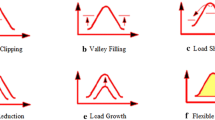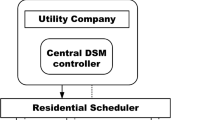Abstract
Demand side management (DSM) is beneficial for the reduction in energy consumption during peak hours. DSM in large-scale buildings modifies the load profile of these extensive consumers, playing a significant role in reducing the peak load. This research work uses genetic algorithm (GA) to optimize the load curve of a large-scale building with industrial loads. The objectives are to mitigate the energy cost and peak to average ratio (PAR). An optimal schedule is generated for the industrial user based on controllable loads. The consumers are motivated to shift their loads to off-peak hours according to the provided schedule to reduce the peak load and cost of energy. Furthermore, DSM becomes more effective by integration with the renewable energy source distributed generator (DG). Cost reduction becomes more prominent because of load sharing between utility and renewable energy.














Similar content being viewed by others
References
Peter, R., Ramaseshan, B., Nayar, C.V.: Renew. Energy 25(4), 511 (2002). https://doi.org/10.1016/S0960-1481(01)00080-5
Palensky, P., Dietrich, D.: IEEE Trans. Ind. Inf. 7(3), 381 (2011). https://doi.org/10.1109/TII.2011.2158841
Strbac, G.: Energy Policy 36(12), 4419 (2008). https://doi.org/10.1016/j.enpol.2008.09.030
Alasseri, R., Tripathi, A., Rao, T.J., Sreekanth, K.: Renew. Sustain. Energy Rev. 77, 617 (2017)
M. Pipattanasomporn, M. Kuzlu, S. Rahman.: IEEE Trans. Smart Grid 3(4), pp. 2166–2173 (2012). https://doi.org/10.1109/TSG.2012.2201182
Ozturk, Y., Senthilkumar, D., Kumar, S., Lee, G.: IEEE Trans. Smart Grid 4(2), 694 (2013). https://doi.org/10.1109/TSG.2012.2235088
Zhao, Z., Lee, W.C., Shin, Y., Song, K.B.: IEEE Trans. Smart Grid 4(3), 1391 (2013). https://doi.org/10.1109/TSG.2013.2251018
Y. Zhang, P. Zeng, C. Zang, 2015 IEEE International Conference on Cyber Technology in Automation, Control and Intelligent Systems, IEEE-CYBER 2015, pp. 734–740 (2015). https://doi.org/10.1109/CYBER.2015.7288033
Lin, Y.H., Tsai, M.S.: IEEE Trans. Smart Grid 6(4), 1839 (2015). https://doi.org/10.1109/TSG.2015.2388492
H.P. Khomami, M.H. Javidi, 2013 13th International Conference on Environment and Electrical Engineering, EEEIC 2013—Conference Proceedings, pp. 307–312 (2013). https://doi.org/10.1109/EEEIC-2.2013.6737927
Huang, Y., Tian, H., Wang, L.: Int. J. Electr. Power Energy Syst. 73, 448 (2015). https://doi.org/10.1016/j.ijepes.2015.05.032
Khalid, A., Javaid, N., Guizani, M., Alhussein, M., Aurangzeb, K., Ilahi, M.: IEEE Access 6, 19509 (2018). https://doi.org/10.1109/ACCESS.2018.2791546
Basumatary, J., Singh, B.P., Gore, M.M.: ACM Int. Conf. Proc. Ser. (2018). https://doi.org/10.1145/3170521.3170524
R. Rajarajeswari, K. Vijayakumar, A. Modi, Indian J. Sci. Technol. 9(43) (2016). https://doi.org/10.17485/ijst/2016/v9i43/101858
Wen, Z., O’Neill, D., Maei, H.: IEEE Trans. Smart Grid 6(5), 2312 (2015). https://doi.org/10.1109/TSG.2015.2396993
Saravanan, B.: Front. Energy 9(2), 211 (2015). https://doi.org/10.1007/s11708-015-0351-0
Khan, Z.A., Zafar, A., Javaid, S., Aslam, S., Rahim, M.H., Javaid, N.: J. Ambient. Intell. Humaniz. Comput. 10(12), 4837 (2019). https://doi.org/10.1007/s12652-018-01169-y
Jebari, K., Madiafi, M.: Int. J. Emerg. Sci. 3(4), 333 (2013)
Someya, H., Yamamura, M.: IEEJ Trans. Electron. Inf. Syst. 122(3), 363 (2002)
Rahim, S., Javaid, N., Ahmad, A., Khan, S.A., Khan, Z.A., Alrajeh, N., Qasim, U.: Energy Build. 129, 452 (2016)
Logenthiran, T., Srinivasan, D., Shun, T.Z.: IEEE Trans. Smart Grid 3(3), 1244 (2012)
Author information
Authors and Affiliations
Corresponding author
Additional information
Publisher's Note
Springer Nature remains neutral with regard to jurisdictional claims in published maps and institutional affiliations.
Rights and permissions
About this article
Cite this article
Sardar, A., Khan, S.U., Hassan, M.A. et al. A demand side management scheme for optimal power scheduling of industrial loads. Energy Syst 14, 335–356 (2023). https://doi.org/10.1007/s12667-022-00510-x
Received:
Accepted:
Published:
Issue Date:
DOI: https://doi.org/10.1007/s12667-022-00510-x




